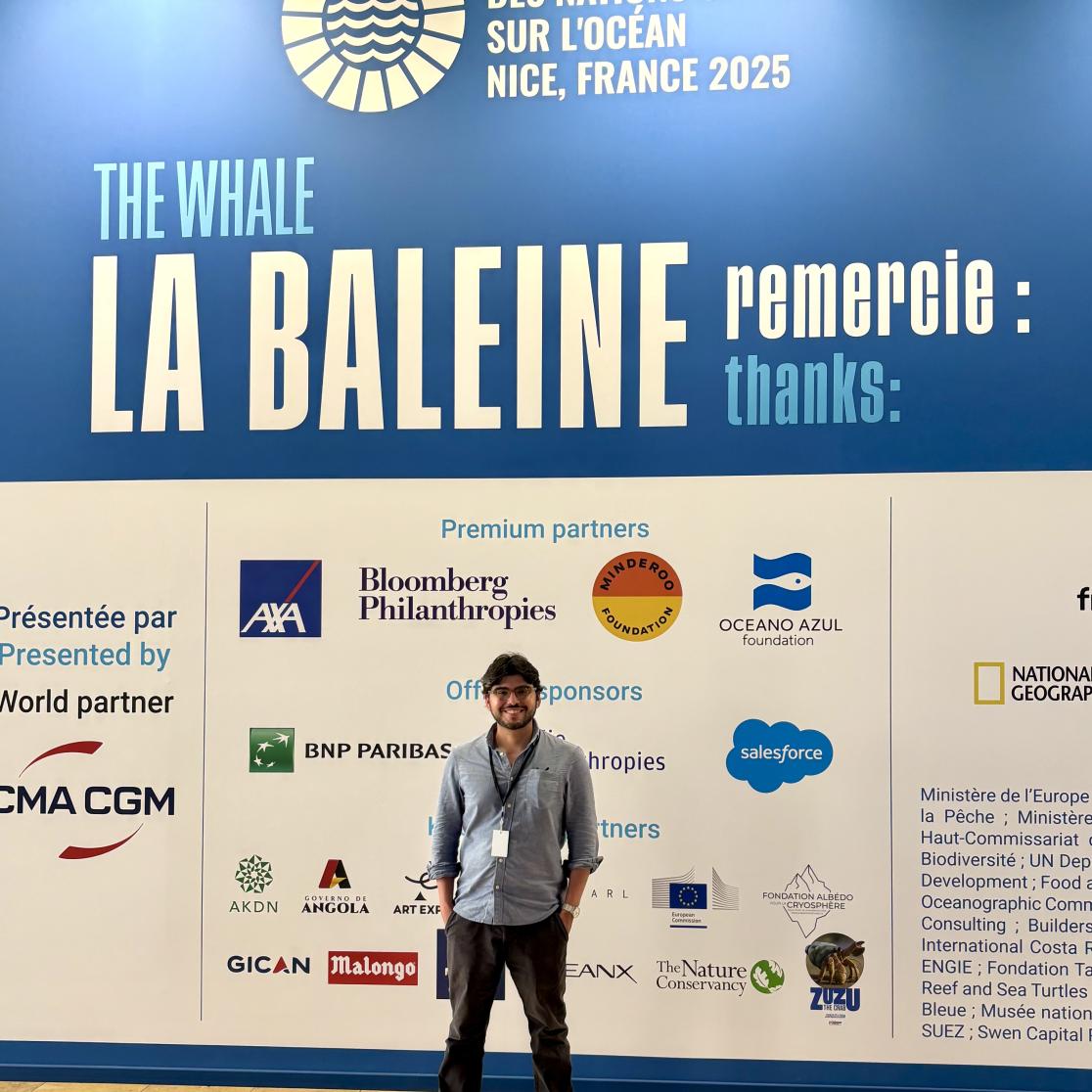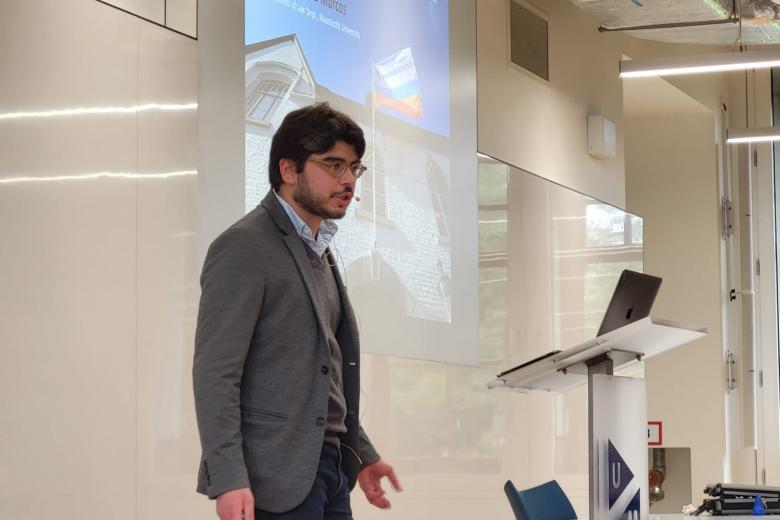A ‘Nice’ Turn for Ocean Governance: The Maastricht-São Paulo Delegation at the United Nations Ocean Conference
From 8–13 June 2025, I had the opportunity to attend the Third United Nations Ocean Conference (UNOC3) in Nice, France, as part of the Maastricht-São Paulo delegation. I participated as a scientific delegate (not representing the interests of any nation), affiliated as a Lecturer at Maastricht University Faculty of Law and a Researcher at CEDMAR (the Centre for Studies on the Law of the Seas at the University of São Paulo).
UNOC3 was not merely a stage for orchestrated handshakes. It was also a melting pot in which diplomats, activists, lawyers and scientists tested the limits of their environmental ambition.
Engagement across the full spectrum of the conference
As part of the CEDMAR delegation, led by Professor Wagner Menezes and joined by Alexander Turra (UNESCO Chair for Ocean Sustainability), Paulo Henrique Reis de Oliveira, Barbara Mourão Sachett, and Eloá Figaro, we engaged across the full spectrum of the conference. We moved between the formal deliberations of the Blue Zone and the more public-facing, discursive spaces of the Green Zone.
Text continues after the photo.

Our work was anchored at the intersection of legal research, policy advocacy, and diplomatic engagement, with a focus on translating scholarly insight into actionable proposals for ocean governance. Our delegation acted as both participant and interlocutor. We presented our research on human rights at sea, contributed to debates around the institutional architecture of the BBNJ Agreement, and advocated for stronger safeguards for marine biodiversity and coastal communities. The sessions we convened or contributed to addressed themes ranging from the rights of seafarers, fishers, Indigenous peoples and local communities to the operationalisation of environmental impact assessments on the high seas.
Our interventions were not abstract theoretical exercises; they addressed concrete and urgent stakes: What role can legal scholarship play in shaping genuinely science-informed ocean governance? How might legal norms be mobilised not to justify, but to interrogate the structures that render marine spaces sites of extraction, exclusion, and ecological harm? And how can legal argumentation open space for alternative futures—ones not already circumscribed by the logics of enclosure, efficiency, and control?
UNOC3 outcomes
Three outcomes from UNOC3 stand out for their potential to shape the international ocean agenda in the coming years.
First, the Nice Ocean Action Plan, adopted by 170 UN member states, was more than a routine political declaration. Through panel interventions and side events, we were able to contribute our perspective to ongoing discussions on human rights, inclusive knowledge systems, and just transitions—issues that now find some reflection in the Plan. The Action Plan consolidates a wide range of voluntary commitments and reiterates the ocean’s centrality to the Paris Agreement and the Sustainable Development Goals. Beyond reaffirming the 30×30 target (protecting 30% of marine areas by 2030) the Plan calls for just transitions in maritime industries, including shipping, tourism, and fisheries. It signals a shift toward more inclusive knowledge systems, urging renewed investment in ocean science alongside Indigenous and local knowledge. The emphasis on equitable financing mechanisms for SDG14 reflects a growing, if overdue, awareness of the structural inequalities embedded in global marine governance.
Second, the BBNJ Agreement (also known as the ‘High Seas Treaty’) moved significantly closer to entering into force. Ratifications increased from 31 to 50 during the Conference, placing the treaty just ten short of the 60 needed. This represents a remarkable acceleration for a legal instrument that has been in development for nearly two decades. Since 2022, the CEDMAR delegation has participated in sessions on treaty implementation and governance frameworks, supporting the broader dialogue as the Agreement moves closer to entry into force. The BBNJ Agreement is designed to govern biodiversity in areas beyond national jurisdiction, which constitute nearly two-thirds of the ocean. It establishes new frameworks for marine genetic resources, area-based management tools (including marine protected areas), and environmental impact assessments. While much will depend on implementation and institutional design, the legal architecture is now in place for a significant expansion of international environmental law.
Third, UNOC3 gave form to the ocean-climate-biodiversity nexus. Initiatives such as the Blue NDC Challenge (co-launched by Brazil and France) seek to embed ocean action more firmly within national climate commitments. Meanwhile, over 200 local governments pledged to enhance adaptation efforts in response to sea level rise. We contributed to multistakeholder dialogues on the interdependence of science-based legal governance frameworks.
These three developments reflect a broader trend: the reconfiguration of ocean governance as a site of climate diplomacy, where legal, ecological, and geopolitical imperatives intersect.
Personal experience
I believe it was important to have a representative of our Law Faculty present, not simply to observe, but to speak, question, and co-construct. At ‘La Baleine’—a curated public pavilion at the Ocean Conference, where only a limited number of projects were selected to present and engage with the public—I was asked to comment on the opportunities available to early-career researchers in my institution. I took the opportunity to acknowledge Maastricht University’s curiosity-driven approach to research, the intellectual encouragement offered by select colleagues, and the institutional support from the Faculty of Law, particularly the Science Committee, which made my participation at UNOC3 possible.
I am immensely proud of the work carried out in Nice. It marked a personal milestone, but more importantly, it represented a collective contribution to multilateral processes that remain fragile, yet necessary. While much remains uncertain, I return with a renewed conviction that legal scholarship has a meaningful role to play in shaping the futures of international ocean governance.

H. Jerônimo Bezerra Marcos
Dr Henrique Jerônimo Bezerra Marcos (He/Him/His) is a legal scholar specialising in international law, legal reasoning, and the philosophy of law. His research focuses on how law and technology shape the governance of environmental futures, particularly in the context of the climate crisis and ocean governance.

-
Overriding Mandatory Rules in International Arbitration: Balancing Business Freedom and State Interests
Imagine two companies from different countries enter a business deal. They pick a neutral country’s law to govern their contract and agree to arbitrate any disputes, thinking they can sidestep each other’s national courts. But what if one country’s law absolutely prohibits something in the deal –...

-
What is coercion?
According to classic economic thinking—and to common sense—if two parties agree to a deal, both are made better off, otherwise they would not have agreed. This idea is also reflected in contract law, at least in its basic form, treats consent as the cornerstone of a valid contract. If both sides say...

-
Should Employees Participate in Corporations? A Law and Economics Perspective.
When we speak of corporations, we usually think of shareholders and managers: the former provide capital, the latter make decisions. Yet, without the contributions of its employees, no corporation can survive, let alone thrive. In my PhD thesis, I answered the question of how employee participation...
